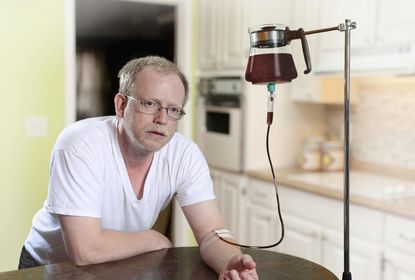This is the one medical experiment all happy coffee drinkers should know about


Research hasn't tended to endorse the ideas of coffee as detrimental to your health — sometimes it suggests quite the opposite — but this one scientific endeavor should warm the hearts of any dedicated java fanatic.
This experiment, the story goes, was conducted on identical twins sentenced to death in Sweden in the second half of the 18th century. King Gustav III, who ruled from 1771 to 1792, wanted to prove his conviction that coffee was a sort of poison for humans, so he offered to commute the sentences to life in prison if one brother would drink three pots of coffee a day and the other three pots of tea. Two doctors were assigned to monitor the experiment. Here I'll hand the story off to Malcolm Gladwell, in a July 2001 New Yorker article:
Unfortunately, the two doctors in charge of the study died before anyone else did; then Gustav was murdered; and finally the tea drinker died, at 83, of old age — leaving the original murderer alone with his espresso, and leaving coffee's supposed toxicity in some doubt. [Gladwell]
The story may not be true, or it may be exaggerated. But Gladwell isn't the only reputable writer to relay the tale. Mark Pendergrast also includes it in his authoritative tome, Uncommon Grounds: The History of Coffee and How It Transformed Our World. Pendergrast notes that the health claims of coffee purveyors has also sometimes pushed the bounds of credibility. But this story Pendergrast passes on is probably close to the truth:
Subscribe to The Week
Escape your echo chamber. Get the facts behind the news, plus analysis from multiple perspectives.

Sign up for The Week's Free Newsletters
From our morning news briefing to a weekly Good News Newsletter, get the best of The Week delivered directly to your inbox.
From our morning news briefing to a weekly Good News Newsletter, get the best of The Week delivered directly to your inbox.
A centenarian Frenchman was told that coffee, which he drank to excess, was a poison. "If it is poison," he said, "I am a fine example of the fact that it is a very slow poison." [Uncommon Grounds]
As an epilogue, Sweden now has one of the highest coffee consumption rates in the world, and the 12th highest life expectancy. Vive le café!
Create an account with the same email registered to your subscription to unlock access.
Sign up for Today's Best Articles in your inbox
A free daily email with the biggest news stories of the day – and the best features from TheWeek.com
Peter has worked as a news and culture writer and editor at The Week since the site's launch in 2008. He covers politics, world affairs, religion and cultural currents. His journalism career began as a copy editor at a financial newswire and has included editorial positions at The New York Times Magazine, Facts on File, and Oregon State University.
-
 Crossword: April 19, 2024
Crossword: April 19, 2024The Week's daily crossword puzzle
By The Week Staff Published
-
 In what states is abortion legal, illegal, and in limbo?
In what states is abortion legal, illegal, and in limbo?In The Spotlight Where American states stand on abortion care
By Theara Coleman, The Week US Published
-
 Sudoku hard: April 19, 2024
Sudoku hard: April 19, 2024The Week's daily hard sudoku puzzle
By The Week Staff Published
-
 Puffed rice and yoga: inside the collapsed tunnel where Indian workers await rescue
Puffed rice and yoga: inside the collapsed tunnel where Indian workers await rescueSpeed Read Workers trapped in collapsed tunnel are suffering from dysentery and anxiety over their rescue
By Sorcha Bradley, The Week UK Published
-
 More than 2,000 dead following massive earthquake in Morocco
More than 2,000 dead following massive earthquake in MoroccoSpeed Read
By Justin Klawans Published
-
 Mexico's next president will almost certainly be its 1st female president
Mexico's next president will almost certainly be its 1st female presidentSpeed Read
By Peter Weber Published
-
 North Korea's Kim to visit Putin in eastern Russia to discuss arms sales for Ukraine war, U.S. says
North Korea's Kim to visit Putin in eastern Russia to discuss arms sales for Ukraine war, U.S. saysSpeed Read
By Peter Weber Published
-
 Gabon's military leader sworn in following coup in latest African uprising
Gabon's military leader sworn in following coup in latest African uprisingSpeed Read
By Justin Klawans Published
-
 Nobody seems surprised Wagner's Prigozhin died under suspicious circumstances
Nobody seems surprised Wagner's Prigozhin died under suspicious circumstancesSpeed Read
By Peter Weber Published
-
 Western mountain climbers allegedly left Pakistani porter to die on K2
Western mountain climbers allegedly left Pakistani porter to die on K2Speed Read
By Justin Klawans Published
-
 'Circular saw blades' divide controversial Rio Grande buoys installed by Texas governor
'Circular saw blades' divide controversial Rio Grande buoys installed by Texas governorSpeed Read
By Peter Weber Published